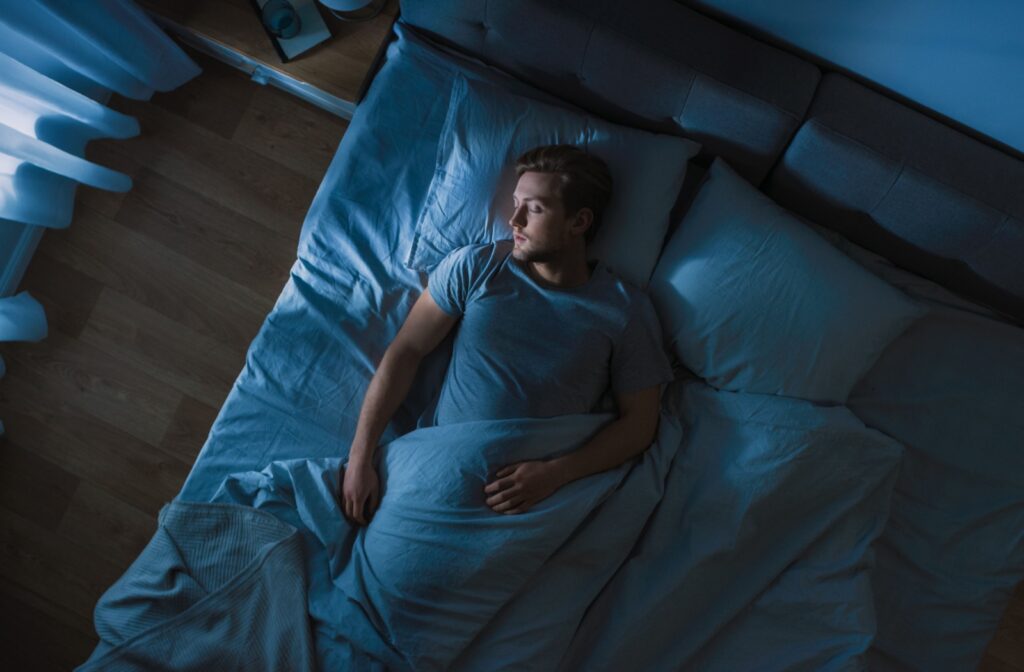If you’ve ever experienced the nagging discomfort of a tension headache, you’re all too familiar with the subtle yet persistent pain that can dampen your day. Tension headaches can have many causes, and while the research doesn’t connect them directly to dry eyes, the two conditions may share common triggers.
There isn’t a one-size-fits-all answer to the cause of your dry eyes or tension headaches because causes can vary widely between them. Simple home remedies like an over-the-counter (OTC) pain reliever or lubricating eye drops are often enough to provide relief.
If you experience persistent symptoms, you should see your eye doctor for an examination. There could be an underlying issue that’s causing your dry eyes or tension headaches.
Understanding Dry Eye
Dry eye disease is a prevalent condition that affects the eye’s ability to maintain adequate lubrication. This issue arises when the tears produced by the eyes are insufficient in quantity or quality, leading to discomfort and potential vision problems.
Cause of Dry Eyes
Dry eyes can result from various factors, including hormonal changes, aging, environmental conditions like wind or dry air, prolonged screen use, certain medications, and underlying health issues that affect tear production or composition.
Symptoms & Effects on Eye Health
Dry eyes can trigger a medley of symptoms beyond mere dryness. You might notice itching, a gritty sensation, or redness. Chronic, untreated dry eye can increase the risk of eye infections, damage to the eye’s surface, and an inability to wear contact lenses.
Exploring Tension Headaches
Tension headaches are the most common type of headache adults experience. They’re not typically associated with nausea or extreme sensitivity to light like a migraine. Instead, they can cause a steady ache that affects both sides of the head and can feel like a tight band.
Common Triggers
There is no single cause for tension headaches. Tense muscles in the neck and scalp are often the root causes. But other triggers include:
- Stress
- Alcohol
- Caffeine
- Colds, the flu, or a sinus infection
- Dental problems such as jaw clenching or teeth grinding
- Eye strain
- Excessive smoking
- Fatigue or overexertion
How Dry Eyes Can Contribute to Tension Headaches
When your eyes are dry, you blink less. This decreased blink rate is associated with dryness. When our eyes lack the natural lubrication provided by blinking that helps distribute the tear film, it can lead to eye strain and a potential byproduct—tension headaches.
Our modern, screen-filled lives are like a pressure cooker for dry eyes and tension headaches. Whether you’re under the fluorescent lights of an office or the glaring light of a computer or smartphone screen, these harsh environments are conducive to eye discomfort and the potential for tension headaches.
Managing Dry Eyes & Tension Headaches
The million-dollar question is how to address these issues separately and together. Here are some strategies to confront dry eyes and the tension headaches they may spark.
Tips for Relieving Dry Eyes
Ultimately, the best treatment for dry eye depends on its root cause. You may need to see your eye doctor for more severe cases. They can offer various in-office or medical treatments that can effectively relieve chronic dry eye symptoms.
At-home remedies you can try include:
- Staying hydrated
- Using OTC artificial tears or lubricating eye drops
- Using a humidifier in your room or office
- Avoiding environmental dry eye triggers like dusty or windy conditions
- Using a warm compress
- Practicing the 20-20-20 rule—every 20 minutes, take a break and look at something 20 feet away for 20 seconds
- Increasing your omega-3 fatty acids intake or considering supplementation

Strategies to Prevent & Treat Tension Headaches
A chat with your eye doctor may be the best option if you’re struggling with chronic tension headaches because they may be able to offer you targeted treatment for effective relief. But there are also some things you can do to help prevent them:
- Manage your stress levels
- Keep your head warm if your headaches are associated with cold temperatures
- Maintain good posture
- Exercise your neck and shoulder muscles to keep them loose
- Get enough sleep and rest
- OTC painkillers
- Massage or acupuncture therapy
- Hot and cold packs
Discuss Your Symptoms with Your Eye Doctor
The intricate interplay between our eyes and heads reminds us of the holistic nature of health. By understanding how dry eyes and tension headaches are intertwined, we can make more informed decisions about our lifestyles and environments.
Prioritizing eye health is not just about maintaining sharp vision. It’s a gateway to overall well-being and might be the solution to that unyielding headache you can’t seem to shake.
There’s relief out there whether you’re dealing with chronically dry eyes or tension headaches that keep returning.
Call our team at Eye Care Center of Colorado Springs today to book an appointment. One of our experienced optometrists can discuss your symptoms with you and offer a treatment plan to bring you much-needed relief.


